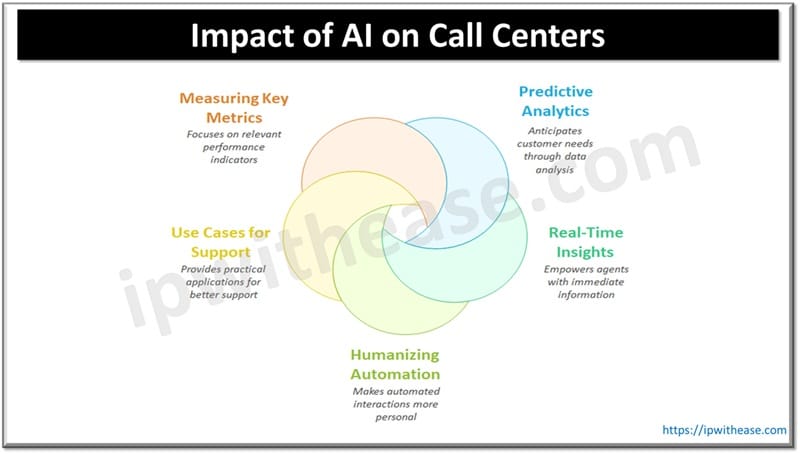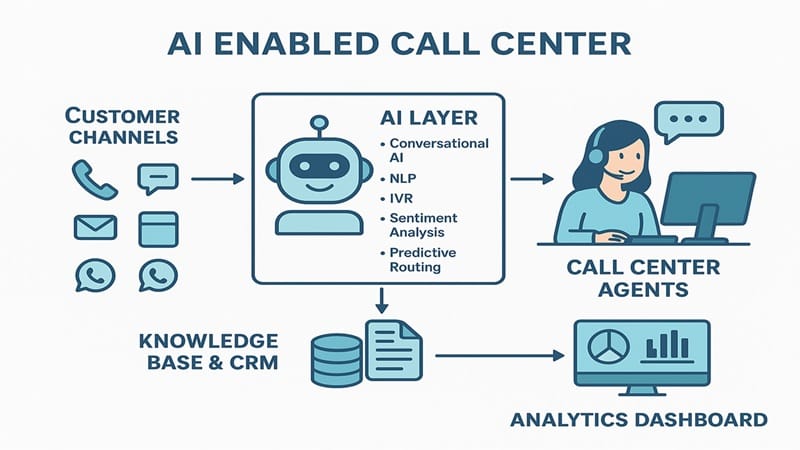Table of Contents
For years, call centers have followed the reactive approach. This means they waited for customers to raise their complaints so they could assist them. However, this approach will no longer work. This is because customers are always looking for proactive and personalized support. In fact, they will not think twice about leaving for a competitor if they are not content.
That is why many call center companies are taking up proactive engagement strategies. In those cases, support teams reach out to the customer before any problem arises.
Interestingly, AI is one of the major forces behind this change. Rather than replacing customer service agents, they are equipping them with tools that anticipate customer requirements. As a result, they can interact and resolve customer issues before the latter raises a complaint.
Therefore, read on to get a better idea of how AI is helping call centers engage customers proactively.

Why AI Is Necessary for Call Centers?
In general, when people think of AI, what comes to mind are chatbots, customer service, and voice assistants. However, this is merely the surface of what AI can do.
Primarily, AI is capable of analyzing large chunks of data. These include call histories, browsing behavior, and more. Hence, by accessing that data, you will be able to find out what your customers might require next. Thereby, you will stay prepared for a customer’s issue beforehand.
In some cases, a customer might repeatedly visit the returns page. This would trigger a system-generated prompt for assistance. Meanwhile, if a customer sentiment drops during a call, AI catches it. This way, the AI suggests real-time coaching tips to the customer service agent.
Major Ways Through Which AI Is Changing Call Centers
The following are the major ways through which AI is changing how call centers operate:
1. It Anticipates Customer Requirements with Predictive Analytics
When it comes to proactive engagement, data is the core of all things. In this case, AI systems go through the following types of data:
- Customer interaction histories
- Product usage logs
- Account data, and more.
From that data, AI looks for patterns to find potential friction points. Hence, with these smart and anticipatory actions, AI helps to improve customer retention and loyalty. As a result of this, customers feel supported.
2. It Empowers Agents with Real-Time Insights
AI tools also do not merely benefit customers. Rather, they also make things easier for customer service agents. In fact, with the help of AI, you will not have to dig through past tickets or ask customers to repeat themselves.
Essentially, you will get real-time insights as soon as a call connects. In general, these insights include the following:
- Customer’s purchase history
- Recent website behavior
- Sentiment analysis
- Suggested next steps.
This will help you jump straight into meaningful conversations. Also, you will not require repetitive verification steps. Moreover, it will boost your confidence and reduce resolution times. In some platforms, you will also get AI-based agent assistance. Here, suggestions will pop up live during calls.
3. It Helps to Humanize Automation
There is a big misconception that AI removes the human element from customer service. However, the truth is just the opposite. What AI does is that it starts handling all the repetitive functions. This way, you (the agent) will be able to focus on the human aspects of the customer service.
Basically, this is common in any AI call centre solution that comes with voice analytics. At the outset, they detect customer frustration and confusion. Thereby, the AI instantly alerts or escalates the case. Hence, it shows that AI merely acts as an extra layer of emotional intelligence.

4. It Provides Use Cases for Better Support
Primarily, proactive engagement is not merely about solving problems. In fact, AI helps call centers a lot in sales and retention processes.
In a situation, a telco might identify customers who are likely to churn on the basis of usage drops. Then, AI flags these accounts for outbound engagement. Thereby, it arms agents with tailored talking points to win them back.
Meanwhile, AI also helps retail brands spot upsell opportunities. It does so on the basis of seasonal buying habits. This way, it triggers a call at just the right moment.
5. It Measures What Actually Matters
If you start utilizing AI for customer engagement, you will be able to measure a lot of things. The following are some of the aspects that AI helps you measure:
- Traditional KPIs (average handle time and first-call resolution)
- Customer sentiment trends
- Agent adherence to scripts
- Success rate of proactive engagement
- Churn reduction
Hence, with the help of these insights, call centers will be able to iterate fast. Also, they can test new strategies and get more ROI.
Implement AI Now!
If you want to make the most of AI, you do not have to make major changes in your call center. In this case, you might start with small steps. These include predictive routing or AI-generated post-call summaries. This way, you will be able to build out other capabilities gradually.
Moreover, it is important to realize that AI will not provide you with a quick fix. Rather, it will help you improve on your existing systems. Hence, start utilizing AI intelligently.
ABOUT THE AUTHOR
IPwithease is aimed at sharing knowledge across varied domains like Network, Security, Virtualization, Software, Wireless, etc.



